Politicians in Northern Ireland will face intense pressure from LGBT rights campaigners to “catch up” with the rest of western Europe after the Irish Republic overwhelmingly backed same-sex marriage in a referendum.
The Irish Congress of Trade Unions will join Amnesty International and gay rights group the Rainbow Project to hold a mass rally in support of equal marriage rights on 13 June, while a legal test case has also been lodged with Belfast’s courts.
After Friday’s historic referendum, in which the Republic’s voters endorsed same-sex marriage by 2-1, Northern Ireland remains the last country in western Europe where LGBT couples are barred from getting married [see footnote].
Attempts to legislate to allow gay marriage have been vetoed by the Democratic Unionist party and a majority of Ulster Unionists in the devolved Northern Ireland assembly at Stormont.
An ICTU spokesman said the region needed to catch up with the rest of democratic Europe – and in particular every other part of the UK. “In 1998 Northern Ireland became one of the most advanced places on earth for human rights. Section 75 of the Good Friday agreement dealt with human rights and enshrined the rights of every citizen to be treated equally in Northern Ireland,” he said.
“Since then Northern Ireland has slipped back in terms of the human rights agenda and is now isolated in the UK as the only place where a gay couple cannot get married. The rally will be held in solidarity with the gay community.”
Section 75 of the Good Friday agreement guarantees the right of every citizen to avail themselves of state services in the region. LGBT rights campaigners believe that these services include marriages in civil spaces such as council chambers.
Amnesty’s campaign director in Northern Ireland, Patrick Corrigan, has called for a mass turnout at the rally, which will start from Belfast’s Writers Square at 2.30pm. Corrigan said people in Northern Ireland should show they are “sick of living in a discriminatory backwater for gay people”.
Last month, a Sinn Féin motion on marriage equality fell after 47 Stormont assembly members voted in support while 49 unionists voted against. Even if there had been a small majority in favour, the DUP would have exercised a special veto drawn up under devolution.
The so-called Petition of Concern allows any party to veto legislation if they can argue the law would not have sufficient cross-community/Protestant-Catholic support.
Praising the Republic’s electorate, John O’Doherty, director of the Rainbow Project, said: “We are all simply elated at this stunning, landslide victory for our sisters and brothers in the Republic. They have brought Ireland on a journey of acceptance and they have done so with grace, compassion and good humour.”
The Rainbow Project has confirmed that an English couple are challenging the gay marriage ban in Northern Ireland. That case is expected to reach the courts in Belfast by November.
DUP objections to a bill of rights that would cover Northern Ireland and the Republic are based more on religious than political grounds, the Guardian has learned. It is understood one of the main reasons the DUP continues to block the bill of rights – promised in the wake of the Good Friday agreement – is because it might lead to gay couples having the right to marry.
A source told the Guardian on Sunday: “The DUP now appears more obsessed with gay people and their demands than any traditional, sectarian objections to the bill of rights. It reflects the continued strong influence of the evangelical Christian lobby within the party.”
Meanwhile, the Catholic church in Ireland is trying to come to terms with the size of the vote in favour of gay marriage. A majority of 62% backed the constitutional change in the first referendum of its kind on Friday.
Diarmuid Martin, the archbishop of Dublin, said the church “needed a reality check” after the outcome. “I ask myself, most of these young people who voted yes are products of our Catholic school system for 12 years. I’m saying there’s a big challenge there to see how we get across the message of the church,” Martin said after Saturday’s result.
The senior Catholic cleric and former Vatican diplomat warned that the church should “not move into denial of the realities”. Only one of the Republic’s parliamentary constituencies, Roscommon South Leitrim, voted no. Out of total of just over 3 million voters, 1,149,390 backed same-sex marriage while 684,616 voted no.
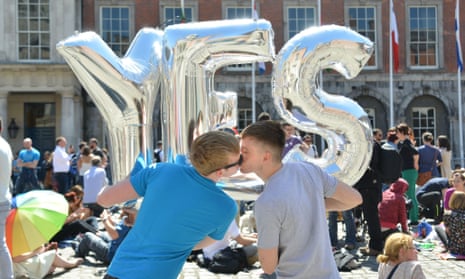
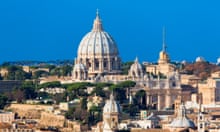

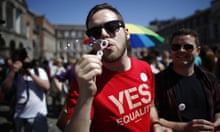
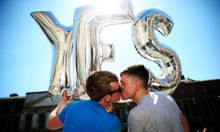
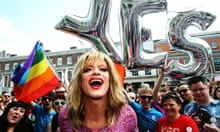

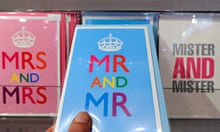
Comments (…)
Sign in or create your Guardian account to join the discussion